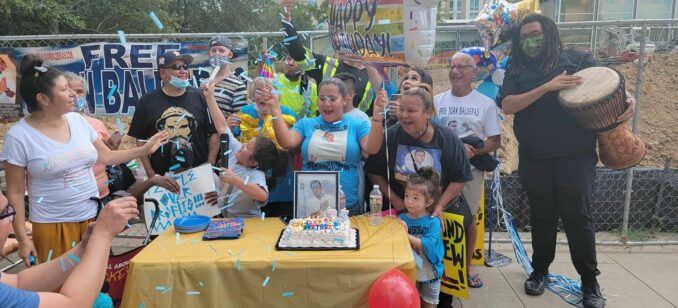Happy Birthday, Juan Balderas!
A few days in advance of his 35th birthday, family, friends and supporters of Texas death row prisoner Juan Balderas gathered by the dozens to celebrate, sing Happy Birthday, speak to the media and eat some delicious cake his mother brought to share.

Juan’s wife, Yancy Balderas, center, leads the group in celebration.
Balderas has been on death row for 8 years, fighting to prove his innocence. Fortunately for Balderas, his spouse and family have not only stood by him but visibly and legally fought for him. They have marched, rallied, held press conferences and lobbied the state legislature to bring his case to the public’s attention.
There have been television specials on his case and extensive news coverage in English- and Spanish-language media. Balderas was born in Mexico and has dual citizenship. His spouse, Yancy Balderas, is from El Salvador. Since both are bilingual, media coverage is easily accomplished in both languages.
On the day of his birthday party outside of the Harris County Criminal Courthouse, Estrella TV covered Balderas’ case and the party. A crew of reporters from Colombia were also there. They are doing an in-depth “60 Minutes” type program in Spanish to be shown throughout Latin America.
Being locked up in a prison, a jail or a detention center can be a harrowing, cruel and brutal experience. What can help ease the pain and problems of any kind of detention? Good lawyers and a supportive, outspoken network of family and friends. And money.
An incompetent court-appointed attorney or a lack of family support can not only keep a person incarcerated, but can cause many mental and physical health issues. Fortunately for Balderas, he has competent attorneys and strong support from his family and friends.
On any given day, there are over 2 million people locked up in the U.S. According to the U.S. Department of Justice. “One in seven state and federal prisoners (14%) and 1 in 4 jail inmates (26%) reported experiences that met the threshold for serious psychological distress (SPD) in the 30 days prior to being surveyed. Similarly, 37% of prisoners and 44% of jail inmates had been told in the past by a mental health professional that they had a mental disorder.” (tinyurl.com/8bwesemw)
“Each year in prison reduces an individual’s life expectancy by about 2 years,” according to the Prison Policy Initiative. But the family is also affected, reducing immediate family members’ life expectancy by from 2.6 years to 4.6 years. (tinyurl.com/s6mdayb)
Until the prison-industrial complex can be dismantled and abolished, working-class people must visibly, financially and emotionally support any friends, family or fellow activists who are incarcerated.
As Yancy Balderas told the crowd at Juan’s birthday celebration, “We will not stop fighting until Juan is exonerated. We will not stop until the DA turns over the evidence they should have given us at trial 8 years ago. We are not stopping. We will continue fighting. We are not going away until Juan gets justice — either his freedom or a fair new trial!”
-30-

